2020中考英语语法复习——情态动词的类型、基本用法总结与同步练习 学案 (有答案)
文档属性
| 名称 | 2020中考英语语法复习——情态动词的类型、基本用法总结与同步练习 学案 (有答案) |  | |
| 格式 | zip | ||
| 文件大小 | 23.3KB | ||
| 资源类型 | 教案 | ||
| 版本资源 | 人教新目标(Go for it)版 | ||
| 科目 | 英语 | ||
| 更新时间 | 2020-05-23 09:42:53 | ||
图片预览




文档简介
初中英语语法 —— 情态动词的类型与基本用法总结(附同步练习)
一、情态动词的基本概念
(一)情态动词:情态动词是一种本身有一定的词义,主要用于增加语言表达的情态色彩,表示说话人对有关行为或事物的主观态度和看法,认为其可能、应该或必要等。
(二)特征:① 不能单独做谓语,必须与其他动词一起构成谓语;② 没有人称和数的变化;
③ 情态动词后必须跟动词原形;④ 具有助动词功能。
(三)初中英语常见的情态动词:must, shall, should, had better, can (could), may (might), will (would);
need和dare(既可以作情态动词,也可以作实义动词)。
二、情态动词的基本用法
1. can (could)
1) 表示能力,意为“能、会”,即有某种能力,尤其是生来具备的能力,此时may和must不可代替它。
例句:She can swim fast, but I can’t . 她能游得很快,但我不能。
例句:I can see with my eyes. 我用眼睛看。
2) 表示请求、许可,常在口语中。这里可以用may代替。
例句:Can I borrow your bike?
You can/may use my dictionary. 你可以用我的字典。
3) 表示推测,意为“可能”,常用于否定句和疑问句中,此时can’t不是“不能”而是“不可能”。
例句:The news is true. 这消息是真的。
表推测、怀疑:→ Can the news be true? 这个消息会是真的吗?
例句:— Can it be our teacher? 那个人有可能是我们老师吗?
— No, it can’t be our teacher. He is having a meeting. 不可能。咱们老师正在开会呢。
4)表达询问意见或建议
例句:Could you please give me a hand?
Would you please pass me some salt?
注意:Can / Could you (please) do sth? = Would you (please) do sth?
(此类表达询问意见,并且希望获得肯定回答的句型中some 不需要变any)
can与could的区别:
1)could形式上是can的过去式,意义相同,表示能力。
例句:He could write poems when he was 10. 他十岁时就会写诗。
2)could在疑问句中,表示委婉的语气,此时 could 不表示过去。
例句:Could you do me a favour? 你能帮我个忙吗?
— Could I use your pen? 我能用一下你的钢笔吗?
— Yes, you can.可以。(注意回答)
2. may (might)
1) 表示请求、许可,比can正式
例句:May I borrow your bike? 我可以借你的自行车吗?
You may go home now. 现在你可以回家了。
注意:may疑问句的回答,常用Yes, please. / Certainly. / Please don’t ./ You’d better not. / No, you mustn’t.等。
【例题】— _______ I borrow your iPad? — Sure . Here you are.
A. May B. Should C. Must D. Would
2) 表示推测,谈论可能性,意为“可能,或许”,一般用于肯定句中。
例句:It may rain tomorrow .明天可能会下雨。
例句:She may be at home.她可能在家呢.
3) may的过去式为might,表示推测,可能性低于may。
例句:He is away from school. He might be sick.他离开学校了,可能是他生病了。
4) 表示希望、祈求、祝愿,常可译为“祝愿”。句型通常是may +主语+动词原形。
例句:May you have a good time.祝你过得愉快。
例句:May you be happy! 祝你幸福!
may与might的区别:
1)might形式上是might的过去式,意义相同,表示可能。
例句:He might not be home when you called him last night. 你昨天晚上给他打电话时,他可能并不在家。
2)might在表示请求、允许时,表达比may更委婉的语气,此时 might不表示过去。
①请求别人允许自己做某事,两者都可用。
例句:May (Might) I sit here?我可以坐在这里吗?
I wonder if I migh task you a favor?不知能否请你帮个忙?
I’d like to ask a question if I may.如果可以的话,我想提个问题。
②自己允许别人做某事,通常要用may而不用might。
例句:You may come in now.你现在可以进来了。
You may not tell him this.你不可以告诉他这件事。
3. must
must 表示“必须,肯定,一定”, 否定形式mustn’t = must not表示“禁止”。
1) must 表示主观看法,意为“必须、一定”。
例句:You must stay here until I come back.在我回来之前你必须呆在这儿。Must I hand in my homework right now? 我必须现在交作业吗?
2) 其否定形式mustn’t表示:一定不要 ‖ 禁止, 不许.
例句:You mustn’t play with fire. 你不许玩火。
You mustn’ t be late. 你一定不要迟到。
3) must引导的疑问句,肯定回答为must,否定回答为needn’t 或 don’t have to .
例句:—Must I finish my homework?我现在必须完成作业吗?
—No, you needn’t.不,你不必。
(4)must表示有把握的推测,用于肯定句。
例句: The light is on, so he must be at home now.灯亮着,他现在肯定在家。
must与haveto的区别:
①must表达主观意愿的“必须”,have to表达客观外部因素导致的“不得不”。
例句:I must study hard. It’s too late. I have to go now.
②must 没有人称和时态的变化,而have to有。
例句:He had to walk back home because he lost all his money.
Mom will be away for a week, so we will have to do the cooking by ourselves.
4.need
1) need 表示需要、必须,主要用于否定句和疑问句中,其否定形式为needn’t,意为―没有必要,不必‖。 用need 提问时,肯定回答为 must,否定回答为 needn’t或don’t have to。
例句:—Need I stay here any longer? 我还有必要留在这儿吗?
—Yes, you must .是的。 —No. you needn’t /don’t have to. 不,你不必。
2) need 还可以作实义动词,此时有人称、数和时态的变化,如果是人作主语后边多接动词不定式。
例句:I need to do it right now. 我需要马上做这件事。
He needs to learn more about the girl.他需要多了解那个女孩。
need doing 与 need to be done的区别:
①.主动形式的动名词doing具有被动的含义;
②.该动名词可以改为其动词不定式的被动形式而句子的意义不变。
例句:. The door needs painting. = The door needs to be painted. 那扇门需要油漆一下。
Your car needs mending. = Your car needs to be repaired. 你的车需要维修了。
3) need 作名词
be in (great) need of sth = need sth (badly) “非常需要某物”
meet the need “满足需要(需求)”
there is/was no need (for sb) to do sth “某人没必要做某事”
5. dare
dare意为“敢、敢于”, 可以作实义动词,也可以作情态动词。
1)实义动词dare后面接动词不定式to do
例句:I dare to swim across the river I don't dare to say that.
Do you dare to jump off the cliff ? (肯定回答:Yes, I do. 否定回答:No, I don't.)
2)dare作情态动词时后面接动词原形。
例句:I daren't say that.
Dare you go with me? (肯定回答:Yes, I dare. 否定回答:No, I dare not.)
How dare you say that?
If he dare break the rule , he will be punished .
注意:dare作情态动词时主要用于疑问句,否定句和条件从句中,不用于肯定句。
6. shall
1). 表请求或询问意见、建议,常用于I、We两种人称的疑问句。
Shall I get some tea? 我给你点茶好吗?
Shall we go out for a walk? 我们出去散步好吗?
2). 提建议或征求对方意见的其他表达方式:
(1).用“Let's do...”来提出建议。如:Let's go for a walk after supper.
(2).用“What/How about...?”来提出建议;about后接名词或动词ing形式。
What about/How about a drink? What about/How about taking Tom with us?
(3).用“Why not...?”来提出建议,表示“何不 ”not面后接动词原形。“Why not...?”实际上是“Why don't you/we...?”的简略形式。 Why not meet at the school gate at eight? Why don't we stay here another day?
(4).用“Would you like...?”来提出建议,意思是“你想要 吗?”Would you like后可接名词或不定式。
Would you like a cup of tea? Would you like to go and see her?
7. should
1) should 意为“应该”,可表示劝告、建议、义务、责任等。否定形式 shouldn’t = should not表示“不应该”
例句:We should protect the environment.我们应该保护环境。
2)表推测、估计。
They should be home by now. 他们现在应该已经到家了。
3) should have done 过去本应当做某事但却没有做,表示对过去动作的责备、批评。
例句:You should have finished your homework by now.
到目前为止你应该已经完成作业了。 (事实上没有完成。 )
8. will
1)、表意愿,用于各种人称陈述句。“愿意”
例句:I will help you if I’m free this afternoon. 今天下午如果我有空,我就会帮你。
2)、表请求,用于疑问句。
例句:Will you close the window? It’s a bit cold. 请你把窗户关上好吗?有点冷。
Won’t you drink some more coffee? 再来一点咖啡好吗?
9.would
1)表意愿
例句:I said I would do anything for you. 我说过我愿意为你做任何事。
2)表委婉地提出请求、建议或看法。
常见句型:
①表请求Would you please do ? — OK . / Sorry, .
②Would you like sth? — Yes, please. / No, thanks.
Would you like to do sth? — I’d love to.(接受) — I’d love to, but…… .(拒绝)
注意:此类表达询问意见,并且希望获得肯定回答的句型中,some不需要变any。
10.had better do
had better 意为“最好”,没有人称的变化,后面接不带 to 的不定式, 其否定形式为:had better not。
例句:We had better go now.我们最好现在就走。
You had better not give the book to him.你最好不要把这本书给他。
情态动词专项练习:
1. I __________ you, because I must be wrong.
A. dare not ask B. dare not C. dare not asking D. dare to not ask
2. There __________ some flowers in the garden.
A. were used to be B. used to be C. uses to be D. used to be having
3. "__________ I take it out?" "I'm sorry, you __________."
A. Could ...couldn't B. Might...might not C. Could...can D. May...can't
4. — May I take this book out? — No, you_______.
A. can't B. may not C. needn't D. aren't
5. You_______ go and see a doctor at once because you're got a bad fever.
A. can B. must C. dare D. would
6. All the lights are on, miths __________ up.
A. must get B. is getting C. must be getting D. would get
7. He __________ lead a but he __________ not make it drink.
A. will...can B. may...can C. may...dares D. dare...can
8. — Need we do this job now?
— Yes, __________.
A. you need B. you should C. you must D. you can
9. __________ to have lunch with us today?
A. Do you likes B. Would you like C. Will you liked D. Have you liked
10. He said that you __________ watch TV all the evening if you wished.
A. may B. must C. can D. might
11. — Is John coming by train?
— He should, but he __________ not. He likes driving his car.
A. must B. can C. need D. may
12. Peter __________ come with us tonight, but he isn't very sure yet.
A. must B. can C. may D. will
13. Michael __________ be a policeman, for he's much too short.
A. needn't B. can't C. shouldn't D. won't
14. I thought you __________ be hungry, so I have brought you some cakes.
A. may B. might C. can D. could
15. I wonder how he __________ that to the teacher.
A. dare to say B. dare saying C. not dare say D. dared say
16. Come on! We __________ hurry because there isn't much time left.
A. may B. must C. can D. need
17. Amy did best in the English test. She __________ hard last week.
A. must have working B. should have worked C. should work D. must work
18. The fire spread through the hotel very quickly but everyone __________ get out.
A. had to B. would C. could D. was able to
19. — I stayed at a hotel while in New York.
— Oh, did you? You __________ with Barbara.
A. could have stayed B. could stay C. would stay D. must have stayed
20. It's nearly seven o'clock. Jack __________ be here at any moment.
A. must B. need C. should D. can
参考答案:
1.A 2.B 3.D 4.A 5.B 6.C 7.B 8.C 9.B 10.D
11.D 12.C 13.B 14.B 15.D 16.B 17.A 18.D 19.A 20.C
1
一、情态动词的基本概念
(一)情态动词:情态动词是一种本身有一定的词义,主要用于增加语言表达的情态色彩,表示说话人对有关行为或事物的主观态度和看法,认为其可能、应该或必要等。
(二)特征:① 不能单独做谓语,必须与其他动词一起构成谓语;② 没有人称和数的变化;
③ 情态动词后必须跟动词原形;④ 具有助动词功能。
(三)初中英语常见的情态动词:must, shall, should, had better, can (could), may (might), will (would);
need和dare(既可以作情态动词,也可以作实义动词)。
二、情态动词的基本用法
1. can (could)
1) 表示能力,意为“能、会”,即有某种能力,尤其是生来具备的能力,此时may和must不可代替它。
例句:She can swim fast, but I can’t . 她能游得很快,但我不能。
例句:I can see with my eyes. 我用眼睛看。
2) 表示请求、许可,常在口语中。这里可以用may代替。
例句:Can I borrow your bike?
You can/may use my dictionary. 你可以用我的字典。
3) 表示推测,意为“可能”,常用于否定句和疑问句中,此时can’t不是“不能”而是“不可能”。
例句:The news is true. 这消息是真的。
表推测、怀疑:→ Can the news be true? 这个消息会是真的吗?
例句:— Can it be our teacher? 那个人有可能是我们老师吗?
— No, it can’t be our teacher. He is having a meeting. 不可能。咱们老师正在开会呢。
4)表达询问意见或建议
例句:Could you please give me a hand?
Would you please pass me some salt?
注意:Can / Could you (please) do sth? = Would you (please) do sth?
(此类表达询问意见,并且希望获得肯定回答的句型中some 不需要变any)
can与could的区别:
1)could形式上是can的过去式,意义相同,表示能力。
例句:He could write poems when he was 10. 他十岁时就会写诗。
2)could在疑问句中,表示委婉的语气,此时 could 不表示过去。
例句:Could you do me a favour? 你能帮我个忙吗?
— Could I use your pen? 我能用一下你的钢笔吗?
— Yes, you can.可以。(注意回答)
2. may (might)
1) 表示请求、许可,比can正式
例句:May I borrow your bike? 我可以借你的自行车吗?
You may go home now. 现在你可以回家了。
注意:may疑问句的回答,常用Yes, please. / Certainly. / Please don’t ./ You’d better not. / No, you mustn’t.等。
【例题】— _______ I borrow your iPad? — Sure . Here you are.
A. May B. Should C. Must D. Would
2) 表示推测,谈论可能性,意为“可能,或许”,一般用于肯定句中。
例句:It may rain tomorrow .明天可能会下雨。
例句:She may be at home.她可能在家呢.
3) may的过去式为might,表示推测,可能性低于may。
例句:He is away from school. He might be sick.他离开学校了,可能是他生病了。
4) 表示希望、祈求、祝愿,常可译为“祝愿”。句型通常是may +主语+动词原形。
例句:May you have a good time.祝你过得愉快。
例句:May you be happy! 祝你幸福!
may与might的区别:
1)might形式上是might的过去式,意义相同,表示可能。
例句:He might not be home when you called him last night. 你昨天晚上给他打电话时,他可能并不在家。
2)might在表示请求、允许时,表达比may更委婉的语气,此时 might不表示过去。
①请求别人允许自己做某事,两者都可用。
例句:May (Might) I sit here?我可以坐在这里吗?
I wonder if I migh task you a favor?不知能否请你帮个忙?
I’d like to ask a question if I may.如果可以的话,我想提个问题。
②自己允许别人做某事,通常要用may而不用might。
例句:You may come in now.你现在可以进来了。
You may not tell him this.你不可以告诉他这件事。
3. must
must 表示“必须,肯定,一定”, 否定形式mustn’t = must not表示“禁止”。
1) must 表示主观看法,意为“必须、一定”。
例句:You must stay here until I come back.在我回来之前你必须呆在这儿。Must I hand in my homework right now? 我必须现在交作业吗?
2) 其否定形式mustn’t表示:一定不要 ‖ 禁止, 不许.
例句:You mustn’t play with fire. 你不许玩火。
You mustn’ t be late. 你一定不要迟到。
3) must引导的疑问句,肯定回答为must,否定回答为needn’t 或 don’t have to .
例句:—Must I finish my homework?我现在必须完成作业吗?
—No, you needn’t.不,你不必。
(4)must表示有把握的推测,用于肯定句。
例句: The light is on, so he must be at home now.灯亮着,他现在肯定在家。
must与haveto的区别:
①must表达主观意愿的“必须”,have to表达客观外部因素导致的“不得不”。
例句:I must study hard. It’s too late. I have to go now.
②must 没有人称和时态的变化,而have to有。
例句:He had to walk back home because he lost all his money.
Mom will be away for a week, so we will have to do the cooking by ourselves.
4.need
1) need 表示需要、必须,主要用于否定句和疑问句中,其否定形式为needn’t,意为―没有必要,不必‖。 用need 提问时,肯定回答为 must,否定回答为 needn’t或don’t have to。
例句:—Need I stay here any longer? 我还有必要留在这儿吗?
—Yes, you must .是的。 —No. you needn’t /don’t have to. 不,你不必。
2) need 还可以作实义动词,此时有人称、数和时态的变化,如果是人作主语后边多接动词不定式。
例句:I need to do it right now. 我需要马上做这件事。
He needs to learn more about the girl.他需要多了解那个女孩。
need doing 与 need to be done的区别:
①.主动形式的动名词doing具有被动的含义;
②.该动名词可以改为其动词不定式的被动形式而句子的意义不变。
例句:. The door needs painting. = The door needs to be painted. 那扇门需要油漆一下。
Your car needs mending. = Your car needs to be repaired. 你的车需要维修了。
3) need 作名词
be in (great) need of sth = need sth (badly) “非常需要某物”
meet the need “满足需要(需求)”
there is/was no need (for sb) to do sth “某人没必要做某事”
5. dare
dare意为“敢、敢于”, 可以作实义动词,也可以作情态动词。
1)实义动词dare后面接动词不定式to do
例句:I dare to swim across the river I don't dare to say that.
Do you dare to jump off the cliff ? (肯定回答:Yes, I do. 否定回答:No, I don't.)
2)dare作情态动词时后面接动词原形。
例句:I daren't say that.
Dare you go with me? (肯定回答:Yes, I dare. 否定回答:No, I dare not.)
How dare you say that?
If he dare break the rule , he will be punished .
注意:dare作情态动词时主要用于疑问句,否定句和条件从句中,不用于肯定句。
6. shall
1). 表请求或询问意见、建议,常用于I、We两种人称的疑问句。
Shall I get some tea? 我给你点茶好吗?
Shall we go out for a walk? 我们出去散步好吗?
2). 提建议或征求对方意见的其他表达方式:
(1).用“Let's do...”来提出建议。如:Let's go for a walk after supper.
(2).用“What/How about...?”来提出建议;about后接名词或动词ing形式。
What about/How about a drink? What about/How about taking Tom with us?
(3).用“Why not...?”来提出建议,表示“何不 ”not面后接动词原形。“Why not...?”实际上是“Why don't you/we...?”的简略形式。 Why not meet at the school gate at eight? Why don't we stay here another day?
(4).用“Would you like...?”来提出建议,意思是“你想要 吗?”Would you like后可接名词或不定式。
Would you like a cup of tea? Would you like to go and see her?
7. should
1) should 意为“应该”,可表示劝告、建议、义务、责任等。否定形式 shouldn’t = should not表示“不应该”
例句:We should protect the environment.我们应该保护环境。
2)表推测、估计。
They should be home by now. 他们现在应该已经到家了。
3) should have done 过去本应当做某事但却没有做,表示对过去动作的责备、批评。
例句:You should have finished your homework by now.
到目前为止你应该已经完成作业了。 (事实上没有完成。 )
8. will
1)、表意愿,用于各种人称陈述句。“愿意”
例句:I will help you if I’m free this afternoon. 今天下午如果我有空,我就会帮你。
2)、表请求,用于疑问句。
例句:Will you close the window? It’s a bit cold. 请你把窗户关上好吗?有点冷。
Won’t you drink some more coffee? 再来一点咖啡好吗?
9.would
1)表意愿
例句:I said I would do anything for you. 我说过我愿意为你做任何事。
2)表委婉地提出请求、建议或看法。
常见句型:
①表请求Would you please do ? — OK . / Sorry, .
②Would you like sth? — Yes, please. / No, thanks.
Would you like to do sth? — I’d love to.(接受) — I’d love to, but…… .(拒绝)
注意:此类表达询问意见,并且希望获得肯定回答的句型中,some不需要变any。
10.had better do
had better 意为“最好”,没有人称的变化,后面接不带 to 的不定式, 其否定形式为:had better not。
例句:We had better go now.我们最好现在就走。
You had better not give the book to him.你最好不要把这本书给他。
情态动词专项练习:
1. I __________ you, because I must be wrong.
A. dare not ask B. dare not C. dare not asking D. dare to not ask
2. There __________ some flowers in the garden.
A. were used to be B. used to be C. uses to be D. used to be having
3. "__________ I take it out?" "I'm sorry, you __________."
A. Could ...couldn't B. Might...might not C. Could...can D. May...can't
4. — May I take this book out? — No, you_______.
A. can't B. may not C. needn't D. aren't
5. You_______ go and see a doctor at once because you're got a bad fever.
A. can B. must C. dare D. would
6. All the lights are on, miths __________ up.
A. must get B. is getting C. must be getting D. would get
7. He __________ lead a but he __________ not make it drink.
A. will...can B. may...can C. may...dares D. dare...can
8. — Need we do this job now?
— Yes, __________.
A. you need B. you should C. you must D. you can
9. __________ to have lunch with us today?
A. Do you likes B. Would you like C. Will you liked D. Have you liked
10. He said that you __________ watch TV all the evening if you wished.
A. may B. must C. can D. might
11. — Is John coming by train?
— He should, but he __________ not. He likes driving his car.
A. must B. can C. need D. may
12. Peter __________ come with us tonight, but he isn't very sure yet.
A. must B. can C. may D. will
13. Michael __________ be a policeman, for he's much too short.
A. needn't B. can't C. shouldn't D. won't
14. I thought you __________ be hungry, so I have brought you some cakes.
A. may B. might C. can D. could
15. I wonder how he __________ that to the teacher.
A. dare to say B. dare saying C. not dare say D. dared say
16. Come on! We __________ hurry because there isn't much time left.
A. may B. must C. can D. need
17. Amy did best in the English test. She __________ hard last week.
A. must have working B. should have worked C. should work D. must work
18. The fire spread through the hotel very quickly but everyone __________ get out.
A. had to B. would C. could D. was able to
19. — I stayed at a hotel while in New York.
— Oh, did you? You __________ with Barbara.
A. could have stayed B. could stay C. would stay D. must have stayed
20. It's nearly seven o'clock. Jack __________ be here at any moment.
A. must B. need C. should D. can
参考答案:
1.A 2.B 3.D 4.A 5.B 6.C 7.B 8.C 9.B 10.D
11.D 12.C 13.B 14.B 15.D 16.B 17.A 18.D 19.A 20.C
1
同课章节目录
- 词法
- 名词
- 动词和动词短语
- 动词语态
- 动词时态
- 助动词和情态动词
- 非谓语动词
- 冠词
- 代词
- 数词和量词
- 形容词副词及其比较等级
- 介词和介词短语
- 连词和感叹词
- 构词法
- 相似、相近词比较
- 句法
- 陈述句
- 一般疑问句和否定疑问句
- 特殊疑问句及选择疑问句
- 反意疑问句
- 存在句(There be句型)
- 宾语从句
- 定语从句
- 状语从句
- 主谓一致问题
- 简单句
- 并列句
- 复合句
- 主谓一致
- 主、表语从句
- 名词性从句
- 直接引语和间接引语
- 虚拟语气
- 感叹句
- 强调句
- 倒装句
- 祈使句
- 句子的成分
- 句子的分类
- 题型专区
- 单项选择部分
- 易错题
- 完形填空
- 阅读理解
- 词汇练习
- 听说训练
- 句型转换
- 补全对话
- 短文改错
- 翻译
- 书面表达
- 任务型阅读
- 语法填空
- 其他资料
